General K-class photos

Four K class submarines were built on the west coast. The K-3 at Union Iron Works, San Francisco, the K-4 at Seattle Construction and Drydock in Seattle and the K-7 and K-8, again, at Union Iron Works. The suggestion that this may be the K-3 comes from a few photos showing the K-3 with taller periscope shears plating as seen here. However, the external configuration for the boats can change over time.
We'd be happy if someone could positively identify the background and the boat.
Photo in the private collection of Ric Hedman

These are K-class submarines moored on the south side of the 135th Street piers in New York City as part of the Atlantic Fleet Presidential Review for President Wilson on May 10, 1915. The right-hand submarine is probably the K-6 based on periscope sheers architecture. There actually four submarines in this photo but of the two other there are only portions of the after superstructure visible on the left side of the photo. Also on the left the cage masts and two of the three funnels of the battleship USS Rhode Island (Battleship No. 17) can be seen.
Seen through the bridge structure of the right-hand boat you can see the large sign on the hillside proclaiming "Palisades Amusement Park". Underneath it says "Surf Bathing" and half hidden on the left side of the conning tower fairwater at the river's edge is a sign that says "Warner's Sugar".
On the right side of the photo a person can be just seen walking down the gangway carrying an old fashioned leather satchel. On the gangway between the two boats a sailor is seen walking carrying something unidentifiable in his left hand. He seems totally unconcerned about walking on this 2" by 12" plank with no railings between the boats.
Photo in the private collection of Ric Hedman.

Four K-class submarines, the K-1, K-2, K-5, and K-6, in no particular order, moored at the 135th Street piers in New York City as part of the Atlantic Fleet Presidential Review for President Wilson on May 10, 1915. The crowds curious about these underwater craft take time to look them over.
Library of Congress photo.
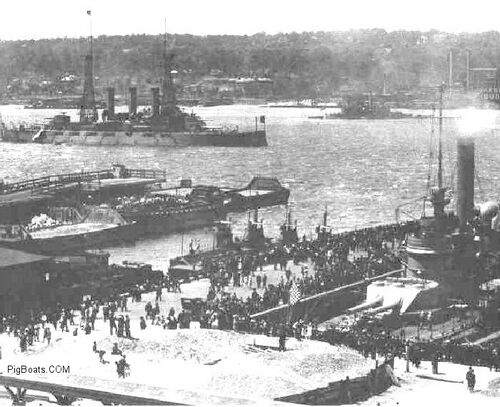
In another view of the 1915 Presidential Review in New York City, K-1, K-2, K-5, and K-6 can be seen in the center moored across the pier from the USS Tonopah (Monitor No. 8). The old monitor was acting as a tender for the four submarines. The USS Rhode Island (Battleship No. 17) looks rather stately anchored in the background. She was a Virginia-class battleship, with the unusual double stacked turrets that contained two 12"/40 caliber guns in the lower half, and two 8"/40 caliber guns in the upper half. In addition, in the right background is a very old (Spanish-American War era) Amphitrite-class monitor.
Library of Congress photo.
Four K-boats moored alongside Navy pier 5A in Honolulu Harbor. The vessel identifications are not readable in this image. The Sand Island lighthouse can be seen in the background. The ship on the left is unidentified and moored at Navy pier 5. The K-boats were sent to Hawaii to replace the F-class submarines. The same ships that towed these submarines to Hawaii towed the F-boats back to the mainland. I estimate this photo to be in late 1915 or early 1916.
U.S. Navy photo.
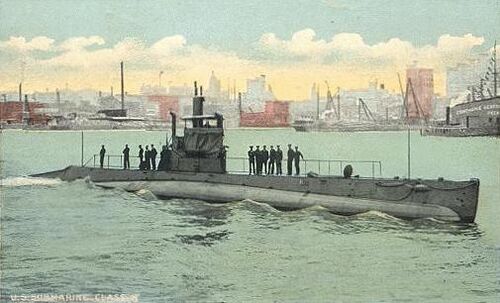
A color post card showing an unknown K-class submarine in the East River off New York City, circa 1915-1916.
Photo in the private collection of Ric Hedman.

This photo of three K-class submarines was taken at Tampa, Florida circa 1915-1916. All three of these boats left for the Azores on October 12, 1917 and arrived there on October 27, 1917. The canvas bridge structure were quickly discarded in favor of the metal "chariot bridges" in use by the British and Germans.
Photo courtesy of the John Hayward Family Photo Album.

Three of the K-class submarines moored in San Diego, California circa 1914. It is known that the USS K-3, K-4, K-7 and K-8 were West Coast submarines at this time. Which of these 4 submarines these are can't be determined from this photo. The location of San Diego is certain because of the presence of the side wheel ferry steamer Ramona in the right background. The Ramona plied the San Diego Harbor waters from 1903 to 1932.
It is known that this is a pre WW I photo due to the pipe and canvas bridge weather covers. These were almost totally replaced during the First World War by the steel chariot bridge that afforded better protection from seas and quicker diving since they did not need to be disassembled.
National Archives photo.

K-1, K-2, K-6, and K-5 prior to going over to Europe in 1917. The location is possibly the Norfolk Navy Yard in Virginia. The USS Florida (Battleship No. 30) is moored in the background.
Photo in the private collection of Ric Hedman.
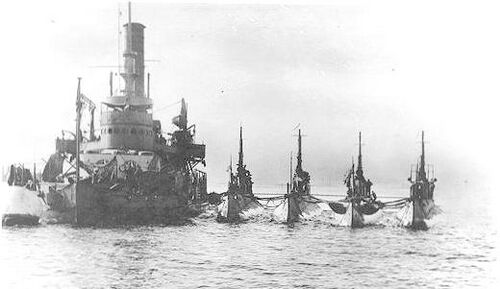
Four K-boats alongside the tender USS Cheyenne (Monitor No. 10), serving as flagship and tender for Division 3, Flotilla 1, Submarine Forces, Atlantic Fleet. Photo date approximately 1917-1918.
Photo in the private collection of Ric Hedman.
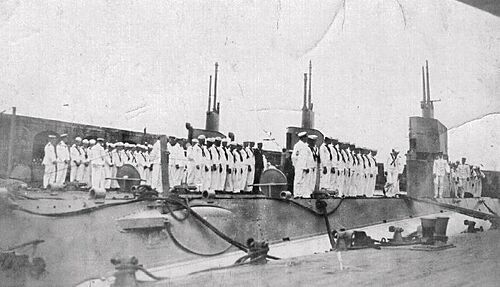
Three K-boats moored to the dock in Ponta Delgada, Azores, 1918. The crews are at quarters for what looks like a formal ceremony. The exact purpose is unknown, but one sailor is about to step onto the brow to go ashore. This may be the ceremony where a sailor departing for a new command is "gonged off" the boat, having been honored by the Commanding Officer and his shipmates for his service.
Photo provided by Cliff Leverette, grandson of Norman McKinnon who served aboard the K-2.

A view of the aft deck of an unknown K-class submarine, date and location unknown. The photo was taken from the bridge.
Photo courtesy of MMCM(SS) Rick Larson, USN (Ret.).

Lookouts on the bridge of an unknown K-class submarine, date and location unknown. Note the extensions added to the sides of the fairwater that provided the crew with a little extra standing space on the narrow top.
Photo courtesy of MMCM(SS) Rick Larson, USN (Ret.).
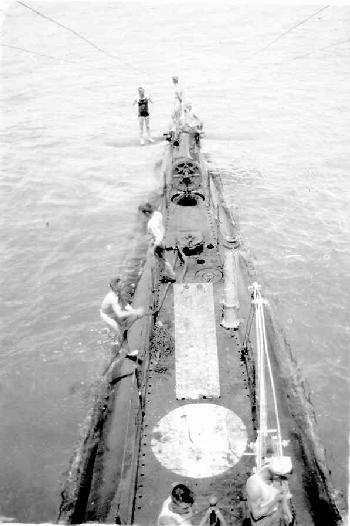
The crew of a K-class submarine enjoying a swim call, date and location unknown. Opportunities for recreation were few, so swim calls were a popular activity. The torpedo room access hatch is open, and the bow planes are rigged out as makeshift diving platforms.
Photo courtesy of MMCM(SS) Rick Larson, USN (Ret.).
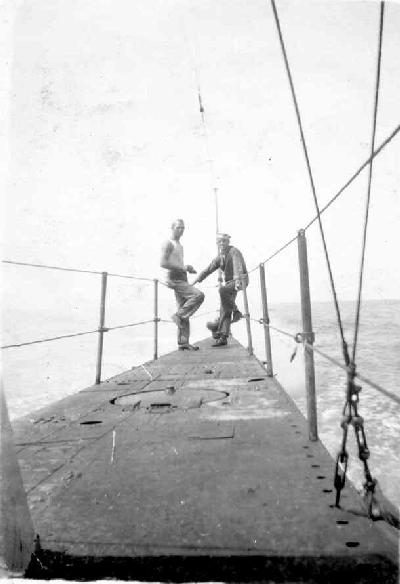
Three crewmen of an unknown K-class submarine catching some fresh air on the aft deck while underway. Date and location unknown.
Photo courtesy of MMCM(SS) Rick Larson, USN (Ret.).

This photo was in the Philadelphia newspaper the Evening Public Ledger on Saturday June 29, 1919. It shows at least four submarines in Philadelphia Navy Yard League Island drydock. We are not sure which boats these are, but records show that the K-7 and K-8 were drydock there for extensive overhauls as well as the K-1 and K-5. Based on another photo we have seen the K-5 could be the boat on the left in this photo. In total there were up to 11 submarines in the dry dock at one time in 1919.
Photo courtesy of Mike Mohl at Navsource.org.
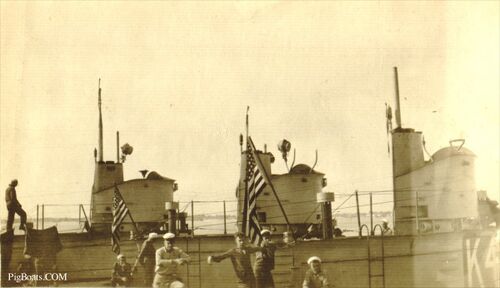
K-4 (Submarine No. 35) and two other unidentified K-boats in St. Petersburg, Florida, February 23, 1920. The fairwaters on all three boats have received typical post-war modifications. They have permanent metal "chariot" bridge structures, with prominent curved spray shields covering part of the bridge. The two boats on the left have been outfitted with periscopes captured from a German U-boat. The USN was quite impressed with the optical quality of the German instruments, and the service learned a lot from studying their construction. K-4 on the right retains her original scopes.
Photo in the private collection of Ric Hedman.
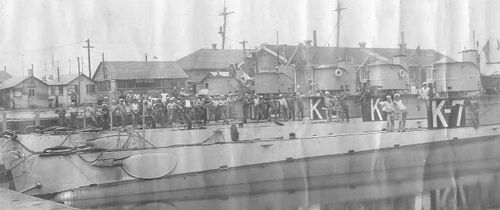
Group photo of three K-class submarines and two N-class submarines at an unknown location, early 1920's. Many of the crewmembers are topside, so this was a posed photo. From left to right are the N-1 (SS-53), N-2 (SS-54), K-8, K-4, and K-7.
Photo courtesy of MMCM(SS) Rick Larson, USN (Ret.).
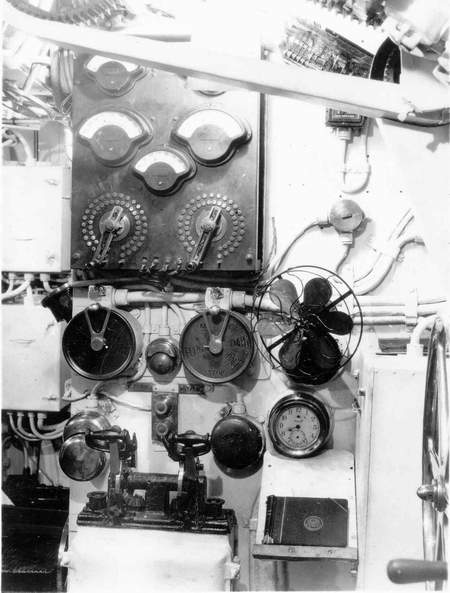
The photo is the after port corner of control room of a K-class boat looking aft. Given the cleanliness and relative lack of clutter I would have to say it was a builder's photo of a K-class. There were a bunch of photos of this class taken. The panel is the main motor control (forerunner of the later control cubicle in the maneuvering room). The slanted bit in the top is the cover over the chain drive from the stern planes motor to the stern planes. The stern planes motor would have been to your right in the photo. The book is for recording the bells or changes in speed commands from the Officer of the Deck. Thanks go to Jim Christley for help in identification of this photo.
Photo in the private collection of Ric Hedman.
Page created by:
Ric Hedman & David Johnston
1999 - 2023 - PigBoats.COM©
Mountlake Terrace, WA, Norfolk, VA
webmaster at pigboats dot com
